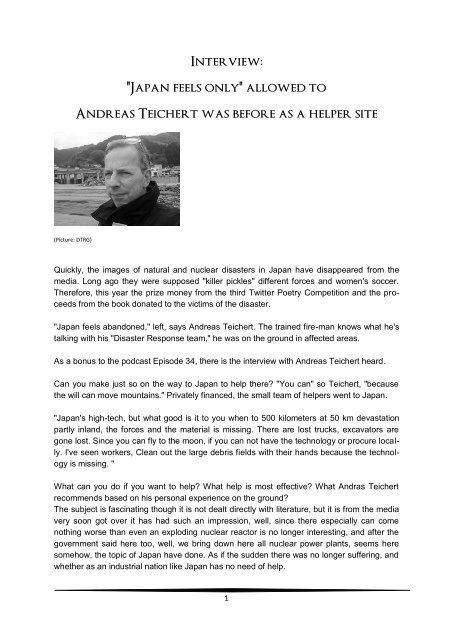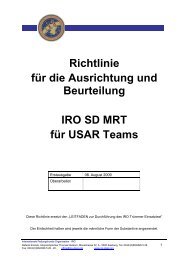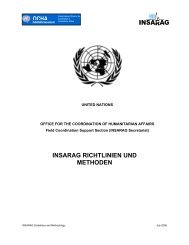Interview: "Japan feels only" allowed to Andreas Teichert ... - DTRG
Interview: "Japan feels only" allowed to Andreas Teichert ... - DTRG
Interview: "Japan feels only" allowed to Andreas Teichert ... - DTRG
Create successful ePaper yourself
Turn your PDF publications into a flip-book with our unique Google optimized e-Paper software.
<strong>Interview</strong>:"<strong>Japan</strong> <strong>feels</strong> only" <strong>allowed</strong> <strong>to</strong><strong>Andreas</strong> <strong>Teichert</strong> was before as a helper site(Picture: <strong>DTRG</strong>)Quickly, the images of natural and nuclear disasters in <strong>Japan</strong> have disappeared from themedia. Long ago they were supposed "killer pickles" different forces and women's soccer.Therefore, this year the prize money from the third Twitter Poetry Competition and the proceedsfrom the book donated <strong>to</strong> the victims of the disaster."<strong>Japan</strong> <strong>feels</strong> abandoned," left, says <strong>Andreas</strong> <strong>Teichert</strong>. The trained fire-man knows what he'stalking with his "Disaster Response team," he was on the ground in affected areas.As a bonus <strong>to</strong> the podcast Episode 34, there is the interview with <strong>Andreas</strong> <strong>Teichert</strong> heard.Can you make just so on the way <strong>to</strong> <strong>Japan</strong> <strong>to</strong> help there? "You can" so <strong>Teichert</strong>, "becausethe will can move mountains." Privately financed, the small team of helpers went <strong>to</strong> <strong>Japan</strong>."<strong>Japan</strong>'s high-tech, but what good is it <strong>to</strong> you when <strong>to</strong> 500 kilometers at 50 km devastationpartly inland, the forces and the material is missing. There are lost trucks, excava<strong>to</strong>rs aregone lost. Since you can fly <strong>to</strong> the moon, if you can not have the technology or procure locally.I've seen workers, Clean out the large debris fields with their hands because the technologyis missing. "What can you do if you want <strong>to</strong> help? What help is most effective? What Andras <strong>Teichert</strong>recommends based on his personal experience on the ground?The subject is fascinating though it is not dealt directly with literature, but it is from the mediavery soon got over it has had such an impression, well, since there especially can comenothing worse than even an exploding nuclear reac<strong>to</strong>r is no longer interesting, and after thegovernment said here <strong>to</strong>o, well, we bring down here all nuclear power plants, seems heresomehow, the <strong>to</strong>pic of <strong>Japan</strong> have done. As if the sudden there was no longer suffering, andwhether as an industrial nation like <strong>Japan</strong> has no need of help.1
scientists we also still had on the side, we were able <strong>to</strong> calculate and assessthe risk and, and Fukushima prefecture, we have but I can tell youfrom our operations center in Tokyo in<strong>to</strong> the mission area we wentalone by bus seven hours, and so you can easily begin <strong>to</strong> imagine the distance,they take forever long, and Fukushima alone then later in thearea 600 km away, which stay in Fukushima was limited only <strong>to</strong> thencalculated hours.And the radiation did not exceed a certain limit, the were exposed?It is of course the case that we have ensured for our calculations arethe radiations have been completely wrong, we leave no residue, we havehad definite protective clothing, we have incorporated no radiation,which means we have no radiation by breathing air or by food intakeabsorbed in<strong>to</strong> the body, and then it would have exceeded a certain value,we could have s<strong>to</strong>pped and continued <strong>to</strong> work in another field, becauseif aid workers are victims, you can not help more effectively.They have let sound through several times that there were also these culturaldifferences, conflicts and demands, it was because even before that time in <strong>Japan</strong>,there they were set on the things that she knew what she must also considercultural in handling victims?So what I can observe with the handling of victims must be that I havelearned in the early days, alone by the fire department work I've done inBerlin, but when they travel <strong>to</strong> <strong>Japan</strong>, then each of when he received agood education has enjoyed. Because, the fact is the basis <strong>to</strong> move forwardin <strong>Japan</strong> We ourselves have never been in <strong>Japan</strong>, but have, myself, atleast <strong>Japan</strong>ese friends, who have already have given one or other advicealong the way, and as for the cultural difference, I can only say goodeducation, manners and respect, then they get in <strong>Japan</strong> is very, very farand are also taken very quickly and already holds a <strong>Japan</strong>ese friend.What was she there for the most interesting experience in this area?There are many countless experiences, heartfelt experience, I can have asituation on the ride <strong>to</strong> the airport <strong>to</strong> the train I lost one eye from myhelmet, the lady came running after me and this has brought me evenafterward. Another lady in the hectic train by mobile phone just probablytrying <strong>to</strong> translate a sentence, came <strong>to</strong> me three times bowed deeplyand thanked him, now that I did 12,000 km in order <strong>to</strong> help these are thebeautiful experience.The other experiences are of course less beautiful because they are hightraumaticstress in the structure, the people are of course well abovecalls for a wide thick, with the processing of emotions, they have a lot5
of discipline, but we also see that people from the open her feelings, andthen they have <strong>to</strong> watch that they deal with people as far as respect,they are gentle and polite <strong>to</strong> be when they have mastered that, thenthey have many wonderful experiences. And even <strong>to</strong>day I get many e-mails from colleagues who are directly working in <strong>Japan</strong> or of thevoluntary helpers who would like <strong>to</strong> thank once more, and view it as agreat respect that we have made this work, and shows that that wehave knocked down the cultural barriers of not much, but probablyhave adapted well.Well of course you would Firefighter, because you want <strong>to</strong> help <strong>to</strong>o, but it is notjust very stressful for such a disaster on the road <strong>to</strong>-be, because it is indeed confrontedyet with sorrow, with misery and death <strong>to</strong> an extent that it exceedsmuch?May well, when will they fire man, probably in his early years when yousee red cars with loud driving through red lights. When the fire in mytime, I'm 43, I am no longer has long been active, I started with 11 years inthe youth fire brigade was also as likely so similar in the army, becauseone is a hard man, as has you do not feel about Ge-speak, and "man" takesup so one (s) does not complain.At the latest strain in inserts that they can have in a city, it handsthem a traffic accident, while her mother came from the vehicle, roadsidestands or sits, and the child must be cut out by firefighters. Then thisis for them a woman as a traumatic readjustment, as if they perceivesuch a big disaster with many victims in <strong>Japan</strong>.Today, it has gotten so that there is in the Berlin fire brigade or fire departmentsin other classical pas<strong>to</strong>ral care, not only for the affectedworkers, but also for the victims of such disasters or accidents, whichhas one now in use at the German Army introduced. We do not have it,we can currently handle even among themselves, one learns over timewith such situations, deal, certainly is not any for it created, and certainlywe have our small aftershocks, the larger pain is I think the earlyreturn from <strong>Japan</strong>, because we simply times, indeed, were confrontedwith a situation where we have left friends who have given us a lot ofconfidence, trust and want <strong>to</strong> disappoint us. But cheer up each other,and support, was among the <strong>Japan</strong>ese in the day, as defined by us in theday.But they will fly again, if I have unders<strong>to</strong>od correctly, there continues <strong>to</strong> beactive locally, and they finance themselves, they said you have <strong>to</strong> imagine yourselfas the one who paid for their efforts?6
We slaughter our piggy banks that you could possibly get <strong>to</strong> the point, itis of course very difficult, we are not a major internationally recognizedorganization, we are a relatively small team, we made a <strong>to</strong>tal ofsix people, including four active and two in Office Services, or make a littlepublicity, is what we our work, we are back and back supports. Forexample, in fire fighting technology in protective equipment which takefire departments or fire equipment manufacturer, otherwise we get onlya very slight financial donations, and most of us <strong>to</strong> save ourselves <strong>to</strong>gether,it is that we have from our past use of frequent flyer miles,Lufthansa, you can we use natural, otherwise we do not have time onour annual vacation or the 13th Monthly salary sacrifice and thosefunds, and of course a third Use this course is also a bit heavier but alsobecause these are always very significant cost, yes, we are just not workingwithin Europe, but in the really distant Asian region.Well, not everyone will say, okay I'll get out there on the way <strong>to</strong> <strong>Japan</strong>, whatemerges from their experience when they experience it on the spot, what can I doas an ordinary German European, <strong>to</strong> help and support, donations or what theywould recommend?I think there are many ways <strong>to</strong> help, I can only give a notice in the firstplace, that is, they send diapers and not send them any clothing that isnow centralized in <strong>Japan</strong> and burned because there really a need forthis article there.What can I say first, what is missing badly, are asbes<strong>to</strong>s-protectivebreathing masks, the masks easy for the assistants in the fields <strong>to</strong> set-<strong>to</strong>,so they are of high asbes<strong>to</strong>s exposure in <strong>Japan</strong> is no longer exposed. Otherwise,of course, there are charities, Germany alone has made the economyand from private donations, with EU funding, there were 2 million, Ithink, donated 45 million for <strong>Japan</strong>. Not always, and also get this infowe have. Are the <strong>to</strong>ols always at the addressee. But that does not meannon-donation, which means they spend quiet, maybe even donate it <strong>to</strong>the German organizations in <strong>Japan</strong> are really active. Donate <strong>to</strong> <strong>Japan</strong>eseorganizations, there are many who need help there. Or there aremany other ideas, there are sometimes in open day, or at other events, asthere is on it, the <strong>Japan</strong>ese sell bags with the red sun, even so they can helpmake a good contribution. Help is very important especially in thisgreat sorrow, that's why I say you donate, bring them material aid <strong>to</strong>the way they organize themselves, or wherever they can find a voice,they speak for <strong>Japan</strong>.How can you support it?Even, how can you support us, we prefer physical aids that are used earmarked,that is, for example, as I carefully approached the asbes<strong>to</strong>s pro-7
tective mask or protective clothing, we ask the helpers available there,we saw that the workers there travel with rubber boots without steelmidsole or yellow Household glovesin the crisis area <strong>to</strong> work, that'swhen the large proportion of metal and scrap metal and anything lyingaround there, of course, highly controversial and leads <strong>to</strong> countlessinjuries, so I tell myself, material assistance is very practical, financialhelp for our missions are also very desirable.How long will it take up in these areas, something like normality enters, or canthe judge simply did not grasp it?I said yes, there are 225 000 square kilometers, where they do not knowwhere <strong>to</strong> begin, but I have this power and this pride of the <strong>Japan</strong>ese experienceitself, we can have not only worked with the volunteers, we havealso lived in the helpers. We have, we have been invited <strong>to</strong> parties, we havehad contact with people in the shelters, we were invited home, we werewelcomed as guests and were also entertained, we had so many wonderfulexperiences that I say it circulated the figures, 10 years, I guess the <strong>Japan</strong>esecan so when they go on, do it well in 4 years.And my impression is, in fact, it goes out very quickly from the media, they willwatch it of course, with their focus even more, they believe that it is indeed thecase for other disasters since Chernobyl have been at least as far as the nucleardisaster long discussed in <strong>Japan</strong> seems <strong>to</strong> be the fast way, the media interest hasdiminished, the pig is driven fast through the village?I think the issue was settled, at least a few days after the explosion ontelevision <strong>to</strong> see the Fukushima Dai-ichi Power plant was so in fact theair was out, so one had the so-called Big Picture, and now come by andby still a few <strong>to</strong>pics. We have of course a difference between Chernobyl'sbeen sitting 25 years ago, we did not have Facebook, we had no Twitter,these two media will continue <strong>to</strong> be active are transporting a lot ofthat has changed the media landscape as a whole. The <strong>Japan</strong> no longercomes in<strong>to</strong> focus, I believe is the price of our fast-paced information era.Those who still talk about Haiti, who still talk <strong>to</strong> it again <strong>to</strong> take alittle closer than the earthquake, the victims still suffer in Italy andwho talks about the refugees on Lampedusa. We currently have theproblem with <strong>to</strong>ma<strong>to</strong>es and cucumbers, where they may come always.And there will be a next new theme. <strong>Japan</strong> is, if you are not actively turnworks just as quickly forgotten, so I see this as more important again atthe issue again and again pick up again until a sense of normalcy in <strong>Japan</strong>and in other crisis areas in the world again with . accompaniedNaturally, all Arabic through the spring, resulting is as tragic andnewsworthy, but how much can or will we transport and set prioritieswhere we want what's important.8
I hope we have made a small contribution now, <strong>Andreas</strong> <strong>Teichert</strong> from the<strong>DTRG</strong>. Thank you.I also thank you very much.* This interview <strong>to</strong>ok place on 15 June 2011 in Berlin recorded.We thank Mr. Wolfgang Tischer for this opportunity and the pleasant conversation.9






